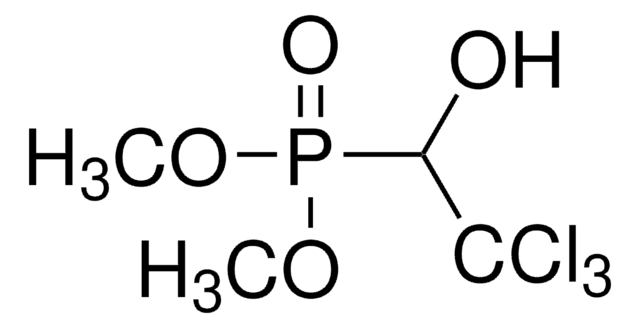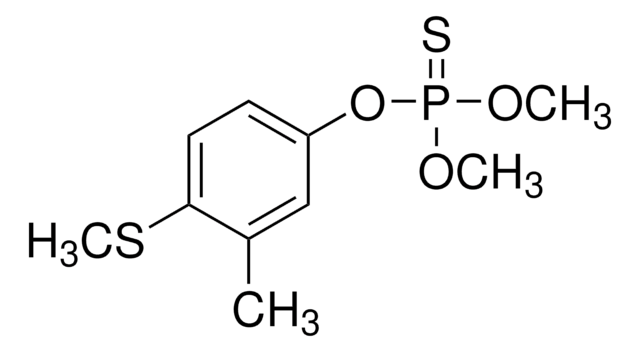33366
Leptophos
PESTANAL®, analytical standard
Synonyme(s) :
O-(4-Bromo-2,5-dichlorophenyl) O-methyl phenylphosphonothioate
About This Item
Produits recommandés
Qualité
analytical standard
Gamme de produits
PESTANAL®
Durée de conservation
limited shelf life, expiry date on the label
Technique(s)
HPLC: suitable
NMR: suitable
gas chromatography (GC): suitable
Pf
71-73 °C
Adéquation
passes test for identity (NMR)
Application(s)
agriculture
environmental
Format
neat
Température de stockage
2-8°C
Chaîne SMILES
COP(=S)(Oc1cc(Cl)c(Br)cc1Cl)c2ccccc2
InChI
1S/C13H10BrCl2O2PS/c1-17-19(20,9-5-3-2-4-6-9)18-13-8-11(15)10(14)7-12(13)16/h2-8H,1H3
Clé InChI
CVRALZAYCYJELZ-UHFFFAOYSA-N
Vous recherchez des produits similaires ? Visite Guide de comparaison des produits
Catégories apparentées
Description générale
Application
Informations légales
Mention d'avertissement
Danger
Mentions de danger
Conseils de prudence
Classification des risques
Acute Tox. 2 Oral - Acute Tox. 3 Dermal - Aquatic Acute 1 - Aquatic Chronic 1 - STOT SE 1
Code de la classe de stockage
6.1A - Combustible acute toxic Cat. 1 and 2 / very toxic hazardous materials
Classe de danger pour l'eau (WGK)
WGK 3
Équipement de protection individuelle
Eyeshields, Faceshields, Gloves, type P2 (EN 143) respirator cartridges
Faites votre choix parmi les versions les plus récentes :
Déjà en possession de ce produit ?
Retrouvez la documentation relative aux produits que vous avez récemment achetés dans la Bibliothèque de documents.
Notre équipe de scientifiques dispose d'une expérience dans tous les secteurs de la recherche, notamment en sciences de la vie, science des matériaux, synthèse chimique, chromatographie, analyse et dans de nombreux autres domaines..
Contacter notre Service technique











